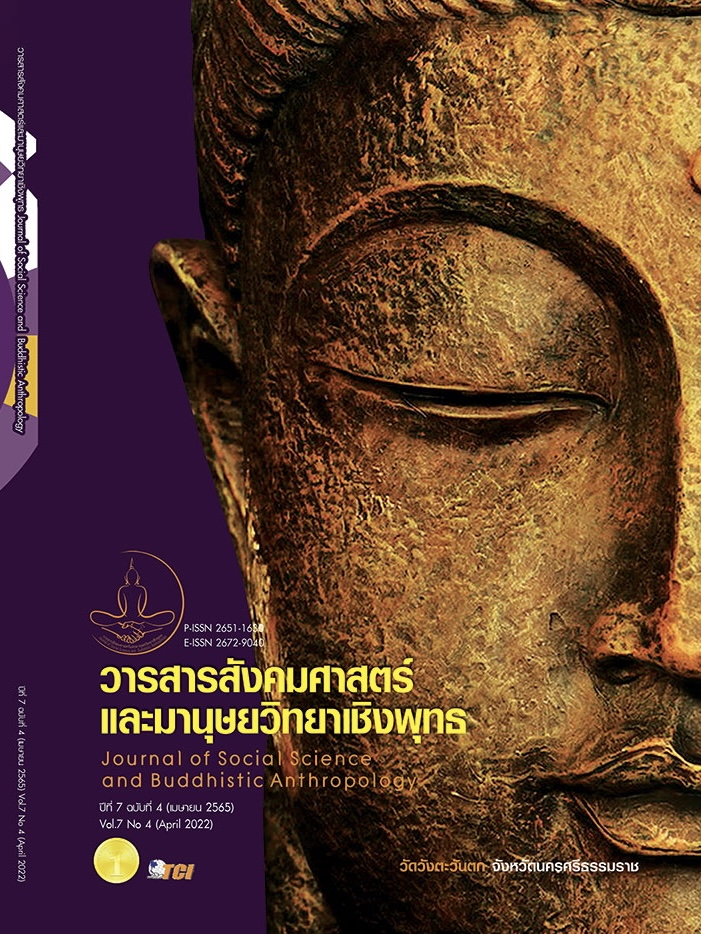THE DEVELOPMENT OF A STORYBOOK SERIES TO RAISE CONSCIOUS MIND IN EARLY CHILDHOOD AGAINST CORRUPTION
Keywords:
Storybook, Raising Consciousness, Anti-Corruption, Early ChildhoodAbstract
The objectives of this research article were to 1) develop a storybook series to raise conscious mind in early childhood against corruption, 2) try out the storybook series and 3) study the results of the storybook series development. It was conducted as research and development. Three phrases of research were implemented: Phrase 1 Storybook series development, Phrase 2 Trying out the storybook series, and Phrase 3 Studying the results of storybook series development. The research instruments included a storybook series to raise conscious mind in early childhood against corruption, evaluation form of knowledge and understanding, and evaluation form of satisfaction towards using a storybook series for teachers/parents. Data was collected by using evaluation forms and questionnaires. The statistics used in this research were mean and standard deviation. The research findings were: 1) according to the survey of early childhood behaviors and interviews with teachers/parents as a basis for creating a series of storybooks, most children had behaviors and attributes of honesty. However, some children liked to steal toys, did not follow the rules. The children’s overall score on their understanding of honesty and anti-corruption was at a moderate level ( = 3.32). The score of storybook appropriateness considered by experts was at a very appropriate level (
= 4.36) that they could be used for organizing activities to raise conscious mind in early childhood. 2) After the storytelling activities, the preschool children’ score of knowledge and understanding about anti-corruption was 17.35 points and the anti-corruption behavior score was 14.26 points, higher than before arranging the activities, and 3) in terms of the results of the storybook series development, the teachers and the parents were satisfied at the most satisfactory level (
= 4.53).
References
กระทู้ถามที่ 445/ร. เรื่อง ความคืบหน้าปัญหาการทุจริตคอร์รัปชันของประเทศ. (2556). ราชกิจจานุเบกษา เล่มที่ 130 ตอนพิเศษ 173 ง (3 ธันวาคม 2556).
กิตติศักดิ์ รัฐประเสริฐ. (2557). การทุจริตในวงราชการไทย: การสังเคราะห์องค์ความรู้ด้านแนวทางการแก้ไขปัญหาจากผู้นำและบุคคลสำคัญของประเทศไทย. วารสาร มฉก. วิชาการ, 18(35), 61-74.
ดารารัตน์ อานันทนะสุวงศ์. (2557). กายวิภาค (Anatomy) : กลโกงการทุจริตคอรัปชั่น. ใน คอร์รัปชั่นและกลไกกำจัดกลโกง. เชียงใหม่: แผนงานสร้างเสริมนโยบายสาธารณะที่ดี (นสธ.) สถาบันศึกษานโยบายสาธารณะ มหาวิทยาลัยเชียงใหม่.
บุญชม ศรีสะอาด. (2556). การวิจัยเบื้องต้น ฉบับปรับปรุงใหม่. กรุงเทพมหานคร: สุวีริยาสาส์น.
บุญเชิด ภิญโญอนันตพงษ์. (2545). ประมวลสาระชุดวิชาการพัฒนาเครื่องมือสำหรับการประเมินผลการศึกษา. (หน่วยที่ 3). กรุงเทพมหานคร: มหาวิทยาลัย สุโขทัยธรรมาธิราช.
ปาณิสรา ปาลาศ. (2550). การใช้กิจกรรมเล่านิทานเพื่อสร้างเสริมพฤติกรรมการพูดความจริงในเด็กอนุบาล. ใน วิทยานิพนธ์วิทยาศาสตร์มหาบัณฑิต สาขาวิชาจิตวิทยาการปรึกษา. มหาวิทยาลัยเชียงใหม่.
ปิมปภา ร่วมสุข และคณะ. (2558). การสร้างสื่อนิทานเพื่อพัฒนาพฤติกรรมคุณธรรมด้านความมีน้ำใจในเด็กปฐมวัย. วารสารวิชาการ มนุษยศาสตร์ สังคมศาสตร์ และศิลปะ, 8(1), 903-922.
พรรณทิพย์ ศิริวรรณบุศย์. (2556). ทฤษฎีจิตวิทยาพัฒนาการ. (พิมพ์ครั้งที่ 6). กรุงเทพมหานคร: สำนักพิมพ์แห่งจุฬาลงกรณ์มหาวิทยาลัย.
มิ่งสรรพ์ ขาวสะอาด. (2557). คำนำ. ใน คอรัปชั่นและกลไกกำจัดกลโกง. เชียงใหม่: แผนงานสร้างเสริมนโยบายสาธารณะที่ดี (นสธ.) สถาบันศึกษานโยบายสาธารณะ มหาวิทยาลัยเชียงใหม่.
สำนักงานเลขาธิการสภาการศึกษา. (2550). นโยบายและยุทธศาสตร์การพัฒนาเด็กปฐมวัย (0 - 5 ปี) ระยะยาว พ.ศ. 2550 - 2559. กรุงเทพมหานคร: วี.ที.ซี. คอมมิวนิเคชั่น.
สิริลักษณา คอมันตร์ และคณะ. (2557). คอรัปชั่นและกลไกกำจัดกลโกง. เชียงใหม่: แผนงานสร้างเสริมนโยบายสาธารณะที่ดี (นสธ.) สถาบันศึกษา นโยบายสาธารณะ มหาวิทยาลัยเชียงใหม่.
อาภาศรี ปุยพันธ์. (2553). การพัฒนาภาวะผู้นำเด็กอัจฉริยะด้วยยุทธศาสตร์สายใยรักครอบครัวเพื่อสร้างเสริมความเข้มแข็งของสังคมอุดมปัญญาใหม่: ศึกษากรณีศูนย์การเรียนรู้ระดับอนุบาลดีเลิศ. ใน ดุษฎีนิพนธ์ศิลปศาสตรดุษฎีบัณฑิต สาขาวิชาภาวะผู้นำเชิงยุทธศาสตร์ความเป็นเลิศ. มหาวิทยาลัยราชภัฏสวนดุสิต.
Erikson, E. H. (1968). Identity: Youth and Crisis. New York: Norton & Company.
Piaget, J. (1959). The language and thought of the child. (3rd ed). New York: Humanities Press.
Downloads
Published
How to Cite
Issue
Section
License
Copyright (c) 2022 Journal of Social Science and Buddhistic Anthropology

This work is licensed under a Creative Commons Attribution-NonCommercial-NoDerivatives 4.0 International License.









